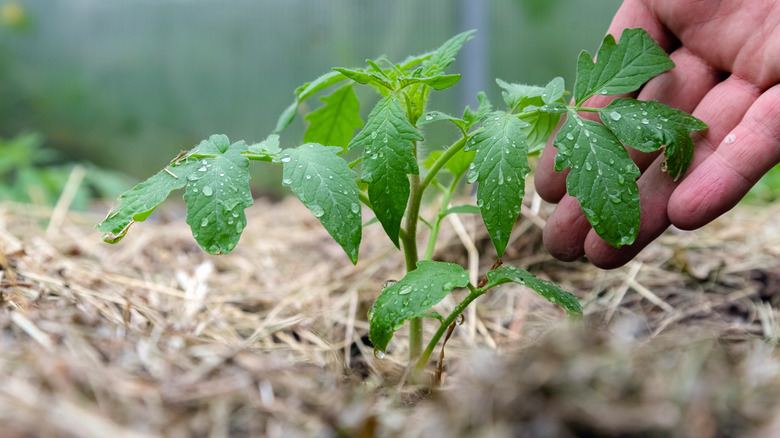Did you know that the delicious tomatoes in your garden undergo a complex ripening process? It’s not as simple as just leaving them to blush on the vine. It’s regulated by various hormones. One crucial hormone involved is ethylene, a gas that acts as a signaling molecule to initiate and coordinate the ripening process. In optimal conditions, tomatoes exhibit a well-orchestrated ripening process, transitioning from green to vibrant red as they mature. However, according to a 2000 study, “Many climacteric fruit are inhibited from ripening or exhibit abnormal ripening at high temperatures,” meaning your tomatoes may be at risk during heat waves.
Excessive heat can inhibit the production of ethylene or alter its sensitivity in tomatoes. The creation and release of ethylene in tomatoes is essential for the conversion of starches into sugars and the development of color and flavor. During heat stress, it can become compromised, and as a result, tomatoes may remain green and fail to attain the desired sweetness and ripeness.
Moreover, heat stress can negatively impact other hormonal pathways, such as abscisic acid. This acid is involved in regulating various physiological processes, including stress responses. Elevated temperatures can trigger an increase in abscisic acid levels, leading to delayed ripening and hampered fruit quality. Therefore, the tomatoes in your garden that have remained green past their expected ripening date are not the product of poor parenting but likely due to the environmental factor of heat stress throughout elongated periods of high temperatures.
How to care for tomatoes in high heat

If you live in a warm climate or are prone to heat waves, you must practice heat-management gardening practices. By employing several strategies, you can encourage tomatoes to ripen efficiently, ensuring a bountiful harvest. One effective approach is to provide adequate shade to mitigate the impact of intense heat. Using shade cloth or planting taller crops nearby can help diffuse sunlight, reducing the stress on tomatoes and preventing excessive heat exposure. Furthermore, maintaining consistent and deep watering practices is crucial. Tomatoes require a well-regulated water supply to support their metabolic processes, especially during periods of heat stress. Deep watering encourages root development and helps plants access moisture even in elevated temperatures.
Applying organic mulch around the base of tomato plants is another beneficial technique. Mulch helps regulate soil temperature, retain moisture, and suppress weeds, creating a more favorable environment for tomato ripening. Additionally, mulch serves as a protective barrier against soil-borne diseases that can affect tomatoes in hot conditions. Careful nutrient management is essential for supporting tomato ripening. Gardeners should ensure a balanced fertilizer application, focusing on potassium-rich options. Potassium plays a key role in fruit development and ripening, making it particularly important in high-temperature scenarios.
Finally, selecting tomato varieties that are well-suited to warmer climates can enhance overall success. Heat-tolerant and quick-ripening varieties are available, offering resilience against extreme temperatures. By combining these strategies, gardeners can optimize growing conditions to enjoy a successful tomato harvest despite the challenging heat conditions.
Tomato varieties for warm climates
To ensure a bigger harvest despite the heat, it may be a good idea to plant heat-resistant tomato varieties. For example, heatmaster tomatoes are well-suited for hot climates. These determinate tomatoes are known for their ability to set fruit even in high temperatures, making them an ideal choice for regions with extended periods of heat. Heatmaster tomatoes typically produce medium-sized, round fruits with a rich red color. Pruning can also help improve air circulation and reduce heat stress, ensuring optimal fruit development.
Solar Fire is a heat-resistant tomato variety renowned for its ability to thrive in hot and sunny conditions. These determinate tomatoes boast a compact growth habit, making them suitable for container gardening or limited space. Solar Fire tomatoes are small to medium in size and feature a robust flavor profile. To cultivate these tomatoes successfully in hot climates, gardeners should plant them in a location with full sun exposure, maintain a regular watering schedule, and provide adequate support for the plants as they bear fruit.
Sun Gold tomatoes are a popular indeterminate cherry tomato variety celebrated for their exceptional flavor and heat tolerance. These small, golden-orange tomatoes are known for their sweetness and are a favorite among gardeners in hot climates. Indeterminate varieties continue to produce fruit throughout the season, allowing for a prolonged harvest. To maximize success with Sun Gold tomatoes, gardeners should provide sturdy support structures, consistent watering to prevent drought stress, and strategic pruning to manage plant growth.
